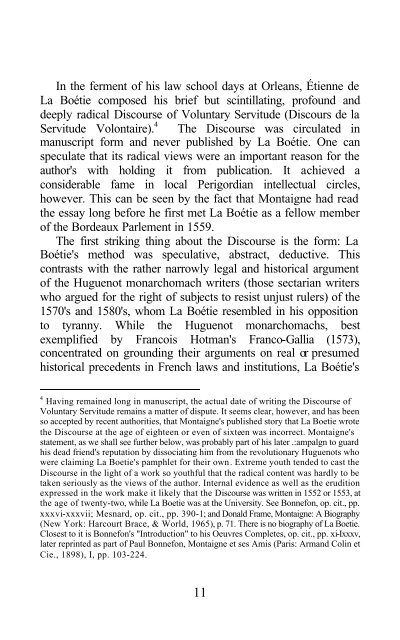You also want an ePaper? Increase the reach of your titles
YUMPU automatically turns print PDFs into web optimized ePapers that Google loves.
In the ferment <strong>of</strong> his law school days at Orleans, Étienne de<br />
La Boétie composed his brief but scintillating, pr<strong>of</strong>ound and<br />
deeply radical Discourse <strong>of</strong> Voluntary Servitude (Discours de la<br />
Servitude Volontaire). 4 The Discourse was circulated in<br />
manuscript form and never published by La Boétie. One can<br />
speculate that its radical views were an important reason for the<br />
author's with holding it from publication. It achieved a<br />
considerable fame in local Perigordian intellectual circles,<br />
however. This can be seen by the fact that Montaigne had read<br />
the essay long before he first met La Boétie as a fellow member<br />
<strong>of</strong> the Bordeaux Parlement in 1559.<br />
The first striking thing about the Discourse is the form: La<br />
Boétie's method was speculative, abstract, deductive. This<br />
contrasts with the rather narrowly legal and historical argument<br />
<strong>of</strong> the Huguenot monarchomach writers (those sectarian writers<br />
who argued for the right <strong>of</strong> subjects to resist unjust rulers) <strong>of</strong> the<br />
1570's and 1580's, whom La Boétie resembled in his opposition<br />
to tyranny. While the Huguenot monarchomachs, best<br />
exemplified by Francois Hotman's Franco-Gallia (1573),<br />
concentrated on grounding their arguments on real or presumed<br />
historical precedents in French laws and institutions, La Boétie's<br />
4 Having remained long in manuscript, the actual date <strong>of</strong> writing the Discourse <strong>of</strong><br />
Voluntary Servitude remains a matter <strong>of</strong> dispute. It seems clear, however, and has been<br />
so accepted by recent authorities, that Montaigne's published story that La Boetie wrote<br />
the Discourse at the age <strong>of</strong> eighteen or even <strong>of</strong> sixteen was incorrect. Montaigne's<br />
statement, as we shall see further below, was probably part <strong>of</strong> his later .:ampalgn to guard<br />
his dead friend's reputation by dissociating him from the revolutionary Huguenots who<br />
were claiming La Boetie's pamphlet for their own. Extreme youth tended to cast the<br />
Discourse in the light <strong>of</strong> a work so youthful that the radical content was hardly to be<br />
taken seriously as the views <strong>of</strong> the author. Internal evidence as well as the erudition<br />
expressed in the work make it likely that the Discourse was written in 1552 or 1553, at<br />
the age <strong>of</strong> twenty-two, while La Boetie was at the University. See Bonnefon, op. cit., pp.<br />
xxxvi-xxxvii; Mesnard, op. cit., pp. 390-1; and Donald Frame, Montaigne: A Biography<br />
(New York: Harcourt Brace, & World, 1965), p. 71. There is no biography <strong>of</strong> La Boetie.<br />
Closest to it is Bonnefon's "Introduction" to his Oeuvres Completes, op. cit., pp. xi-Ixxxv,<br />
later reprinted as part <strong>of</strong> Paul Bonnefon, Montaigne et ses Amis (Paris: Armand Colin et<br />
Cie., 1898), I, pp. 103-224.<br />
11


